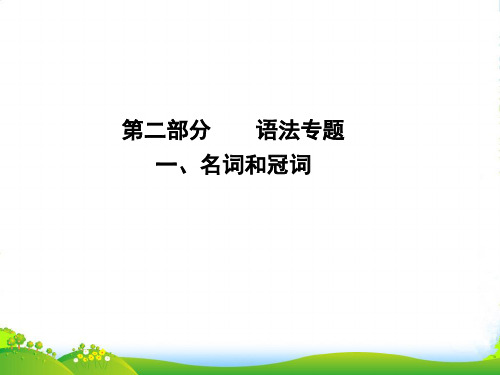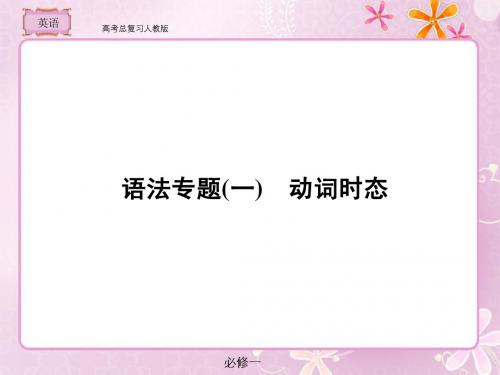英语语法专题1
- 格式:ppt
- 大小:639.00 KB
- 文档页数:18

语法专题一名词[考点解析]一、名词的数1.不可数名词不可数名词没有单复数之分, 它包括抽象名词,物质名词和专有名词. 例如: health, advice, glass, wood. English, America 等.2.可数名词规则的复数形式可数名词包括个体名词和集体名词, 有单, 复数形式. 名词复数构成方法如下:(1)一般情况在名词后加-s, 如: desks, students, pens.(2)以-s, -x, -ch, -sh结尾的名词(以[s][z][t∫][∫]等读音结尾时) 后加-es, 如: buses, boxes,watches, brushes. 故stomach的复数形式为stomachs..(3)以“辅音字母+o”结尾的名词后加-es, 如: heroes, potatoes; 以“元音字母+o”结尾的名词只加-s, 如:bamboos, zoos, radios. 但不少以-o结尾的外来词变为复数时只加-s, 如: radios, photos, pianos; 有些以-o结尾的名词有两种复数形式, 如: zeros/zeroes, volcanos/volcanoes.注: ①有人亦作如下归纳,“以o结尾的英语单词, 表示‘有生命’的事物, 往往加-es, ‘无生命’的往往加s.”②只要记住顺口溜: “黑人Negro和英雄hero喜欢吃西红柿tomato和马铃薯potato”, 你就可以牢记中学教材中出现的以o结尾, 后加-es构成复数的单词了.(4) 以“辅音+y”结尾的名词, 把y改为i, 再加-es, 如: factories, countries.(5) 以“元音+y”结尾的名词, 或以y结尾的专有名词, 直接在词尾加-s, 如: boys, toys,Germanys, Henrys.(6) 以-f或-fe结尾的名词的复数形式有以下三种情况:①多数把f或fe改为v然后再加-es,如:leaves, lives, shelves.②有的直接加-s. 如:roofs, chiefs, gulfs.③有的名词以上两种形式都可以. 如:handkerchieves/handkerchiefs, scarves/scarfs.3.可数名词不规则的复数形式不规则名词的复数形式没有规律可循, 是要单个记忆的. 例如:man→men, woman →women, child→children, foot→feet, tooth→teeth, mouse→mice等4.复合名词的复数形式(1)由若干部分组成并含有一个中心词(指人)的, 将复合名称的中心词变为复数.如:daughters-in-law, passersby, film-goers, shoe-makers, lookers-on, grandchildren.(2)以man或woman作词首, 复合名词前后两个词都是中心词时, 前后两部分都变为复数. 如:men singers, women servants.(3)复合名词中没有中心名词时, 在最后一个词后加-s.如:forget-me-nots, grown-ups,go-betweens.二名词的所有格名词的所有格表示名词的所有关系, 其用法相当于一个形容词, 有两种基本形式, 其一是有生命的人或物,多用名词后加’s构成, 如:my parents’ bedroom; 其二是无生命的东西(包括植物), 多用介词of加名词构成,如:leaves of the tree. 另外要注意, 有时名词可以直接作定语, 而不用其所有格形式, 如:a shoe factory (一家鞋厂)等.注意双重属格:a friend of mine; a former classmate of my father’s.三抽象名词具体化抽象名词在有些情况下会出现“抽象名词具体化”. 在这种情况下, 抽象名词指的不是它所要表达的概念的整体, 而是一个个具体的例子, 指一种, 一场, 一阵或者是表达某种心情. 例如:The play we saw last night was a success.我们昨晚看的那场戏很成功.What a great surprise you gave us!你真是让我们大吃一惊.It’s a pleasure to talk with you.和你谈话真令人高兴The concert was a failure because few people came to watch it.音乐会并不成功, 因为没有什么人来观看.[高考示例]【例一】2005安徽高考My ______of this weekend’s activity is going out with some good friends.A. ideaB. opinionC. mindD. thought提示:侧重对某事的“意见; 看法”, mind指想法; 感觉;思维”,thought指“思考;观念;想法”,idea指“计划;主意;念头;想法”.答案: A【例二】2005 辽宁高考The head office of the bank is in Beijing, but it has ______all over the country.A. companiesB. branchesC. organizationsD. businesses提示:题意为:这家银行的总部设在北京, 但它在全国有很多分支机构. 与总部相对的应该是“分支机构”branches.答案: B【例三】2005 浙江高考I am sure David will be able to find the library--he has a pretty good ______of direction.A. ideaB. feelingC. experienceD. sense提示: sense of direction指“方向感”, 符合题意.have a good idea of意为“对……非常了解”, feeling指“感情”, experience指“经验; 经历”.答案:D【例四】The ______is just around the corner and you won’t miss it.A. bicycle’s shopB. bicycle sho pC. bicycles shopD. bicycles’ shop提示: 本题句意为:自行车商店就在拐角处, 你不会错过它. 此题考查名词作定语, 应用其单数形式. bicycle为无生命的词, 一般不用其所有格形式, 故排除A项. bicycle在此句中起限制作用, 表示买什么东西的商店, shop不用其复数形式.答案:B[触类旁通]1. For years scientists have been worried about the ______of air pol lution on the earth’s natural conditions.A. effectB. resultC. accountD. cause2. The lion is considered to be the king of the forest as it is a (an) ______of courage.A. signB. markC. exampleD. symbol3. Now an increasing number of middle school students go abroad for further study at their own ______, trying hard to realize their dreams.A. priceB. costC. expensesD. pay4. The news that his sick fellow student was getting well and strong brought great ______to Mr.Smith.A. courageB. friendshipC. comfortD. happy5. --Is there any ______to the time that I can stay here?--Yes, you must leave here before he comes back.A. numberB. lengthC. limitD. matter6. It is the ______in Britain that young people often do not shake hands when they meet someonefor the first time.A. customB. habitC. hobbyD. favour7. What did Thomas mean? His letter was so confused that I could hardly make any ______of it atall.A. interpretationB. meaningC. messageD. sense8. Jim was late for two classes this morning. He said that he forgot both of the ______.A. room’s numberB. room numberC. room’s numbersD. room numbers9. –-Excuse me, where are ______offices?--Over there.A. teacher’sB. teachers’C. the teacher’sD. the teacher’s10. We’ll have a ______holiday. What about going to the West Lake?A. two daysB. two-dayC. two-daysD. two day’s答案: 1.A 2.D 3.C 4.C 5.C 6.A 7.D 8.D 9.D 10.B。



英语语法专题一冠词英语的冠词有三个(a, an, the),a和an是不定冠词;the是定冠词。
(一)不定冠词一、知识测练填上恰当的不定冠词。
1.She thinks that English is _______ useful subject and she spends more than _______ hourspeaking it every day.2.I bought _______ new handbag. There was _______ "s" on the corner.3.There is _______ orange and _______ banana on your desk. They are for you.4.Is Germany _______ European country or _______ Asian country?5.They have made quite _______ few friends since they lived in this place.二、知识归纳不定冠词a和an的基本用法:不定冠词a和an都是修饰_________(可数、不可数)名词的单数,表示“一个”的惑思,一般指人或物中的某一个或某一类。
(1)a用在_________(辅音、元音)开头的单词前(注意:辅音不是辅音字母)。
如:a man, a beautiful flower, a heavy bag, a university, a European country(2)an用在_________(元音、辅音)开头的单词前(注意:元音不是元音字母)。
如:an orange, an hour, an honest boy, an unhappy girl, an Asian country, an unusual tree三、知识过关单项选择1.That's not _______ apple. It's _______ pear.A. a, aB. the, aC. an, aD. a, the2.Walk down the road for half _______ hour, you'll see _______ university in front of you.A. a, aB. an, anC. an, aD. a, an3._______ tiger is stronger than _______ sheep.A. A, anB. An. AC. The, /D. A, a4.There's _______ "s" and _______ "u" in the word "use".A. the, theB. an, aC. an, anD. a, an5.China is _______ Asian country, but England is _______ European country.A. an, anB. an, aC. a, anD. a, a6.Is this _______ useful book?—Yes. And it's also _______ interesting book.A. a, aB. a, anC. an, aD. an, an7.I looked down and saw _______ policeman and an old lady, one of David's neighbours.A. aB. theC. anD. 不填8.How far is it from our school to _______ seaside?It is _______ eight-kilometre walk from here.A. the, anB. /, anC. the, aD. /, a(二)定冠词一、知识测练在需要的地方填上定冠词。


中职高考英语二轮复习语法专题1:定语从句(解析版)1.什么是定语从句①There is a beautiful flower.②There is a flower which is beautiful.从以上给到的两个例句,不难看出,两个句子表达的含义是一致的,但表达的方法不一致,加粗的部分都是用来修饰flower这个名词,但①句中是用形容词beautiful来修饰,②句是用一个句子来起到修饰作用。
起到形容词的作用,在句中修饰一个名词或代词的成分,即定语,那么②句中这个句子,就称为定语从句。
句子中被修饰的词叫先行词(即例句中的flower),引导定语从句的词叫关系词(即例句中的which),关系词可以分为关系代词,关系副词。
关系词在定语从句中的作用:一.连接先行词和从句二.在从句中担任一个成分,并与先行词保持数的一致.(简而言之,关系词就是先行词的化身,代替先行词在从句中充当角色)2.定语从句分类定语从句分为限制性定语从句和非限制性定语从句,看以下例句:The teacher told me that Tom was the only person that I could depend on.老师告诉我说汤姆是我唯一的可以依靠的人。
China is a country which has a long history.中国是一个历史悠久的国家。
非限制性定语从句:His mother, who loves him very much, is strict with him.他妈妈十分地爱他,对他要求很严格。
China, which was founded in 1949, is becoming more and more powerful.中国是1949年成立的,现在正变得越来越强大。
限制性定语从句和非限制性定语从句的区别限制性定语从句非限制性定语从句没有逗号隔开有逗号隔开不修饰句子可以修饰主句,引导词用which和as 引导词一般不限制引导词不用that,why先行词可以是名词或代词先行词可以名词,代词,名词短语和句子3.引导词的分类That; which (物)关系代词: who; whom; that(人)whose(人/物);as引导词when (时间)关系副词where (地点)why (原因)高考定语从句的考察主要是关系代词和关系副词用法,只要能准确找出定语从句中的先行词,判断出先行词在从句中充当的成分,选择对应的关系词就可以解决问题。
英语语法系列复习专题一-----名词名词的分类专有名词:指某人,某地,某机构等专有的名称,其首字母要大写。
如HongKong,China,Bill Clinton,Red Cross个体名词:表示某类人或东西中的个体,如 student,book名普可数名词词通集体名词:表示若干个体组成的集合体,如:family,school,group, people 名词不可数名词物质名词:表示无法分为个体的实物,如:cotton,air,tea抽象名词:表示抽象概念,如:work,happiness,news 2.名词的复数可数名词有单、复数形式,其复数的构成规则如下:1)绝大多数在词尾加s。
如:book,books;bag,bags;cup,cups;face,faces.2)以ch,sh,s,x,o结尾的名词加es。
如:watch,watches;brush,brushes;hero,heroes;class,classes;下列以o结尾的词加s构成复数:piano , photo ,radio ,zoo, bamboo ,kilo 3)以辅音字母+y结尾的名词,将y改为i,再加es。
例如:baby,babies;family,families;以元音字母+y结尾的名词,直接加s。
例如:boy,boys;key,keys4)以f或fe结尾的名词,先将f或fe改为v,再加es构成复数形式,如:leaf,leaves;wife,wives.但有些以f结尾的名词,是在f后加s构成复数,常见的有:roof,chief,belief,gulf等。
个别的两种方式都可以,如:handkerchief,’s,handkerchieves 5)少数名词的复数形式是不规则的,要一一背记:man→men; woman→women; Englishman→Englishmen;foot→feet;tooth→teeth; child→children; mouse→mice少数名词的单、复数形式相同,如:Chinese,Japanese,sheep,deer,fish,means(注:fishes表不同种类的鱼)6)复合名词:A.含man或woman的复合名词,两部分都变为复数形式。
Part 1:英语语法框架一·词法:词法研究的对象是各种词的形式及其用法。
英语词类的形式变化有:名词和代词的数,格和性的形式变化;动词的人称、时态、语态、语气等形式变化;以及形容词和副词比较等级的形式变化。
种类:1 名词:是人和事物的名称,如pen(钢笔);English(英语),life(生活)。
2 代词:是用来代替名词的词,如we(我们),his(他的),all(全部)。
3 副词: 是修饰动词、形容词和副词的词,如quickly(快),often(经常),very(很)。
4 数词:是表示“多少”和“第几”的词,如four(四),eighteen(十八),first(第一)5 形容词:用来修饰名词,如great(伟大的),honest(诚实的),difficult(困难的)。
6 动词: 表示动作和状态,如write(写),walk(行走),think(想)。
7 连词: 是连接词、短语、从句和句子的词,如and(和),because(因为),if(假如)8 冠词: 说明名词所指的人或物的词,如a,an(一个),the(这,那)。
9 介词: 表示名词(或代词)与句子里其它词的关系,如from(从),in(在…内),between(在…之间)。
10 感叹词: 表示感情,如oh(噢),aha(啊哈),hush(嘘)。
[注一]属于前六类(名、代、副、数、形、动等词)的词都有实义,叫做实词。
属于后四类(连、冠、介、感等词)的词没有实义,叫做虚词。
[注二]不少词可以属于几个词类,如work(工作;动词和名词),fast(快,形容词和副词),since(自从;连词和介词)等。
构词法定义:构词法是研究怎样造词的学问。
掌握构词法有助于记忆单词,扩大词汇量。
英语单词看似海量,其实真正“原生态”的数量有限,而大量的都是通过构词法造出来的。
如:Foot (足) + ball (球) ------football 足球Sea (海) + food ( 食品) -----seafood 海鲜食品种类:英语最基本的构词法有三种:派生,合成和转化。